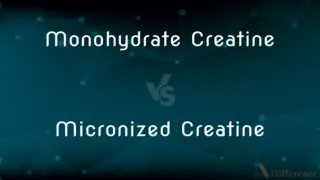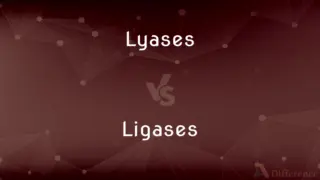Tremor vs. Clonus — What's the Difference?
By Urooj Arif & Maham Liaqat — Updated on May 2, 2024
Tremor is a rhythmic, involuntary muscle movement, commonly seen as a shaking; clonus is a specific type of rhythmic muscle movement triggered by a sudden muscle stretch, often signifying neurological issues.

Difference Between Tremor and Clonus
Table of Contents
ADVERTISEMENT
Key Differences
A tremor is generally understood as an involuntary, rhythmic muscle contraction leading to shaking movements in one or more parts of the body. It is most commonly associated with the hands. On the other hand, clonus is a series of involuntary, rhythmic, muscle contractions and relaxations, which typically occurs in response to a sudden muscle stretch and is often seen in conditions like multiple sclerosis or after a stroke.
Tremors can be caused by various factors including neurological disorders, stress, or caffeine consumption, and can appear in otherwise healthy individuals. Clonus, however, is typically indicative of a neurological condition and is used by medical professionals as a diagnostic tool to assess abnormalities in the nervous system.
While tremors can be continuous or occur sporadically and can affect various body parts including hands, head, and voice, clonus usually affects the ankles or knees and involves a series of quick, rhythmic contractions when the muscle is stretched.
In terms of management, tremors may be treated with medication, lifestyle changes, or in severe cases, surgical interventions. Clonus treatment is more focused on addressing the underlying neurological issue and may include the use of muscle relaxants or other specific therapies aimed at reducing muscle overactivity.
Both tremor and clonus can significantly impact a person’s quality of life, but the presence of clonus is often associated with more severe neurological damage and requires immediate medical attention to identify and treat the underlying cause.
ADVERTISEMENT
Comparison Chart
Definition
An involuntary, rhythmic muscle contraction causing shaking movements.
A rhythmic muscle contraction triggered by sudden stretch, indicating neurological issues.
Commonly Affected Areas
Hands, arms, head, voice, legs.
Ankles, knees.
Causes
Neurological disorders, stress, caffeine, aging.
Neurological damage, stroke, multiple sclerosis.
Symptoms Pattern
Continuous or intermittent shaking.
Series of quick, rhythmic contractions.
Treatment Options
Medication, lifestyle changes, surgery.
Treatment of underlying condition, muscle relaxants.
Compare with Definitions
Tremor
An unintentional, rhythmic muscle movement involving oscillations or contractions.
The old man's hands exhibited a mild tremor as he reached for his tea.
Clonus
A type of rhythmic muscle contraction that typically occurs in response to a sudden stretching.
The doctor tested for clonus by rapidly flexing the patient's foot.
Tremor
Commonly seen in various conditions, including Parkinson's disease.
Parkinsonian tremor typically affects the hands.
Clonus
Mostly affects the lower limbs.
Clonus in his ankle was triggered when his leg was tapped.
Tremor
May affect the voice, causing a shaky sound.
Nervousness caused his voice to tremor as he spoke.
Clonus
Often indicative of serious neurological disorders.
The presence of clonus can suggest multiple sclerosis.
Tremor
Can occur as a reaction to stress or anxiety.
She developed a noticeable tremor during the stressful exam.
Clonus
Requires medical intervention to manage.
After identifying severe clonus, the neurologist recommended specific medications.
Tremor
Sometimes appears as a side effect of medications.
Certain medications caused a slight tremor in her fingers.
Clonus
Can be a diagnostic sign in the neurological examination.
Clonus response was observed during the neurological examination.
Tremor
A tremor is an involuntary, somewhat rhythmic, muscle contraction and relaxation involving oscillations or twitching movements of one or more body parts. It is the most common of all involuntary movements and can affect the hands, arms, eyes, face, head, vocal folds, trunk, and legs.
Clonus
Clonus is a set of involuntary and rhythmic muscular contractions and relaxations. Clonus is a sign of certain neurological conditions, particularly associated with upper motor neuron lesions involving descending motor pathways, and in many cases is, accompanied by spasticity (another form of hyperexcitability).
Tremor
A shaking or vibrating movement, as of the earth.
Clonus
An abnormality in neuromuscular activity characterized by rapidly alternating muscular contraction and relaxation.
Tremor
An involuntary trembling or quivering, as of the hands.
Clonus
(medicine) A muscular spasm with regular contractions.
Tremor
A state or feeling of nervousness, worry, or excitement
The news sent tremors through the stock market.
Clonus
A series of muscular contractions due to sudden stretching of the muscle, - a sign of certain neuropathies.
Tremor
A tremulous sound; a quaver
A tremor in her voice.
Clonus
Convulsion characterized by alternating contractions and relaxations
Tremor
A shake, quiver, or vibration.
She felt a tremor in her stomach before going on stage.
Tremor
A rhythmic, uncontrollable shaking of all or part of the body due to partial muscle contractions.
The optometrist has been losing patients ever since he developed tremors in his hand.
Tremor
An earthquake.
Did you feel the tremor this morning?
Tremor
To shake or quiver excessively and rapidly or involuntarily; to tremble.
Tremor
A trembling; a shivering or shaking; a quivering or vibratory motion; as, the tremor of a person who is weak, infirm, or old.
He fell into an universal tremor of all his joints.
Tremor
An involuntary vibration (as if from illness or fear)
Tremor
A small earthquake
Tremor
Shaking or trembling (usually resulting from weakness or stress or disease)
Tremor
Shake with seismic vibrations;
The earth was quaking
Common Curiosities
What causes a tremor in a healthy person?
In healthy individuals, tremors can be caused by stress, caffeine, or extreme fatigue.
How is clonus treated?
Clonus treatment focuses on the underlying neurological disorder and may involve muscle relaxants and physical therapy.
Is it possible to stop a tremor?
Some tremors can be managed or minimized with medication or surgical interventions, depending on their cause.
Are tremors always a sign of Parkinson’s disease?
No, tremors can be caused by various conditions and are not solely indicative of Parkinson's disease.
What are the risks of ignoring tremor symptoms?
Ignoring tremor symptoms can lead to a delayed diagnosis of potentially serious conditions like Parkinson's disease.
What can exacerbate tremor symptoms?
Stress, increased caffeine intake, and lack of sleep can exacerbate tremor symptoms.
Can anxiety cause tremors?
Yes, anxiety can trigger or worsen tremors in some individuals.
Can clonus appear without any serious condition?
Clonus is usually associated with neurological disorders and rarely appears without an underlying condition.
What lifestyle changes can help with managing tremors?
Avoiding caffeine, managing stress, and regular exercise can help manage tremors.
Are there any specific exercises for reducing clonus?
Physical therapy that includes muscle stretching and strengthening can help reduce clonus.
How often is clonus seen in stroke patients?
Clonus is relatively common in stroke patients, particularly if the stroke affected parts of the brain responsible for motor control.
How does a doctor test for clonus?
Doctors test for clonus by rapidly flexing the affected muscle and observing the rhythmic contractions.
Does clonus ever resolve on its own?
Clonus does not typically resolve on its own and requires treatment of the underlying cause.
Can children have tremors?
Yes, children can experience tremors, which may be benign or indicate a neurological condition.
Is clonus a permanent condition?
Depending on the underlying cause, clonus can be managed but may not be completely reversible.
Share Your Discovery

Previous Comparison
Corrosion vs. Rancidity
Next Comparison
Storm vs. NoreasternerAuthor Spotlight
Written by
Urooj ArifUrooj is a skilled content writer at Ask Difference, known for her exceptional ability to simplify complex topics into engaging and informative content. With a passion for research and a flair for clear, concise writing, she consistently delivers articles that resonate with our diverse audience.
Co-written by
Maham Liaqat














































